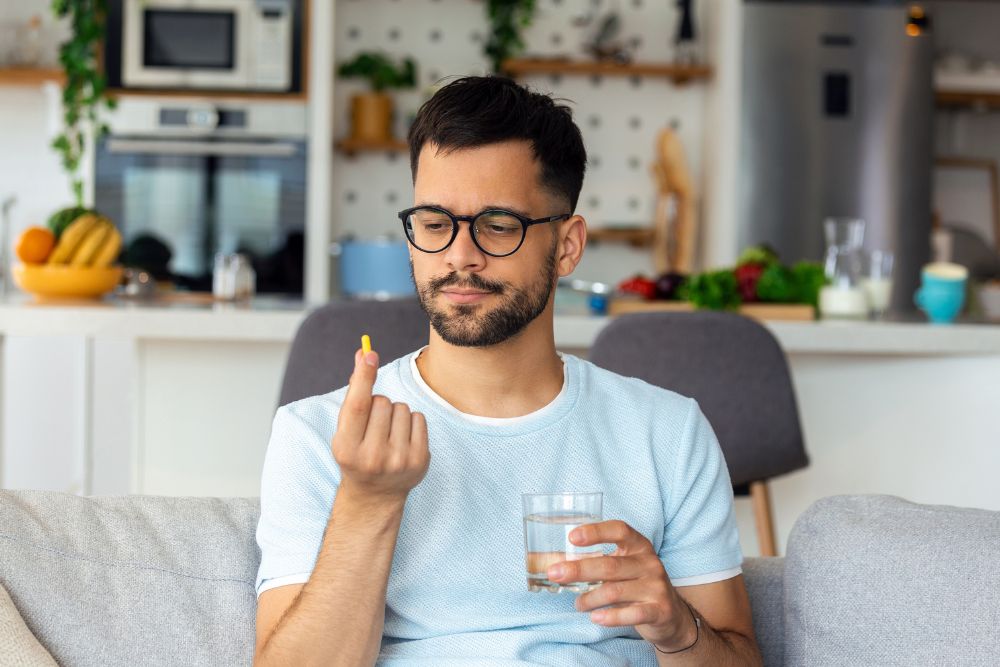Is Gabapentin Addictive? How to Recognize Signs of Misuse

Published: October 9, 2025
Gabapentin, originally developed to treat seizures and nerve pain, has become increasingly common in medical practice. But many patients and their families ask an important question: is gabapentin addictive? While this medication is often prescribed as a safer alternative to opioids, emerging evidence suggests that gabapentin does carry potential for misuse and dependence.
At Rockland Treatment Center in New Port Richey, Florida, we’ve seen firsthand how gabapentin misuse can develop, often unexpectedly. This comprehensive guide will help you recognize the warning signs and understand when professional help may be needed.
What Is Gabapentin and Why Is It Prescribed?
Gabapentin, commonly sold under brand names like Neurontin and Gralise, belongs to a class of medications called anticonvulsants or antiepileptic drugs. Despite its classification, gabapentin works differently than many other medications and affects the nervous system in unique ways.
Common Medical Uses for Gabapentin
Healthcare providers prescribe gabapentin for several conditions:
- Seizure disorders: Managing partial seizures in adults and children
- Neuropathic pain: Treating nerve pain from conditions like diabetic neuropathy and postherpetic neuralgia
- Restless leg syndrome: Reducing uncomfortable sensations and urges to move
- Off-label uses: Anxiety disorders, bipolar disorder, migraine prevention, and fibromyalgia
The medication has gained popularity partly because it’s not classified as a controlled substance in many states, leading some to perceive it as completely safe. However, this perception doesn’t tell the whole story about gabapentin’s addiction potential.
Is Gabapentin Addictive? Understanding the Science
The short answer is yes, gabapentin can be addictive, though it differs from traditional substances of abuse. While gabapentin doesn’t bind to opioid receptors like painkillers, it does affect the brain’s reward pathways and can create physical and psychological dependence.
How Gabapentin Affects the Brain
Gabapentin works by binding to specific calcium channels in the nervous system, reducing the release of excitatory neurotransmitters. This action produces several effects that can be attractive to people seeking mood alteration:
- Feelings of euphoria and relaxation at high doses
- Reduced anxiety and social inhibition
- Enhanced effects when combined with opioids or other substances
- Sedation and dissociation from stress
Research shows that gabapentin misuse is around 40–65% among individuals with prescriptions, and 15–22% of people who misuse opioids also misuse gabapentin.
The Difference Between Dependence and Addiction
When discussing whether gabapentin is addictive, it’s important to distinguish between physical dependence and addiction:
- Physical dependence occurs when your body adapts to the medication, leading to withdrawal symptoms if you stop taking it suddenly. This can happen even when taking gabapentin exactly as prescribed.
- Addiction (or substance use disorder) involves compulsive drug-seeking behavior, inability to control use, and continued use despite harmful consequences. Not everyone who develops dependence will develop addiction, but the risk increases with misuse.
Risk Factors for Gabapentin Addiction
Certain factors increase the likelihood that someone will develop problematic gabapentin use:
- Previous substance abuse: History of alcohol or drug addiction significantly raises risk
- Mental health conditions: Anxiety, depression, or bipolar disorder may increase vulnerability
- Chronic pain: Long-term pain patients may escalate doses seeking better relief
- Polysubstance use: Using gabapentin with opioids, benzodiazepines, or alcohol
At Rockland Treatment Center, we work with individuals who often didn’t realize gabapentin could become problematic. Many started with legitimate prescriptions before their use escalated beyond medical guidance.
Recognizing Signs of Gabapentin Misuse and Addiction
Early recognition of gabapentin addiction signs can make a significant difference in getting help before the problem escalates. Here are the key warning signs to watch for:
Behavioral Warning Signs
- Taking more than prescribed: Using higher doses or taking doses more frequently than directed by a physician is one of the clearest indicators of misuse.
- Seeking multiple prescriptions: Visiting different doctors to obtain multiple prescriptions, a practice known as “doctor shopping,” suggests problematic use.
- Preoccupation with the medication: Constantly thinking about the next dose, worrying about running out, or organizing life around taking gabapentin.
- Social withdrawal: Isolating from friends and family, abandoning hobbies, or neglecting responsibilities at work or school.
- Secretive behavior: Hiding medication use, lying about dosages, or becoming defensive when questioned about gabapentin use.
Physical Signs of Gabapentin Abuse
People misusing gabapentin may exhibit various physical symptoms:
- Drowsiness and excessive sedation
- Dizziness and loss of coordination
- Slurred speech or difficulty concentrating
- Memory problems and confusion
- Vision changes, including blurred or double vision
- Tremors or involuntary muscle movements
- Unexplained weight gain or fluid retention
Psychological Symptoms
The psychological effects of gabapentin misuse can be just as concerning:
- Mood swings and irritability
- Increased anxiety when doses are missed
- Depression or emotional numbness
- Euphoria or unusual elation (particularly at high doses)
- Cognitive impairment and difficulty making decisions
Signs of Gabapentin Tolerance and Escalation
Tolerance develops when the body becomes accustomed to gabapentin, requiring higher doses to achieve the same effect. Signs include:
- Needing to increase doses for pain relief or desired effects
- Running out of prescriptions early
- Combining gabapentin with other substances to enhance effects
- Experiencing reduced effectiveness at previously adequate doses
Gabapentin Withdrawal: What to Expect
One of the strongest indicators that gabapentin is addictive is the presence of withdrawal symptoms when stopping use. Unlike some medications, gabapentin withdrawal can be uncomfortable and, in some cases, dangerous.
Common Gabapentin Withdrawal Symptoms
Withdrawal from gabapentin typically begins within 12 to 48 hours after the last dose and may include:
- Anxiety and agitation
- Insomnia and sleep disturbances
- Sweating and increased heart rate
- Nausea and gastrointestinal upset
- Tremors and muscle pain
- Confusion and disorientation
- Seizures (in severe cases, especially with abrupt cessation)
The severity of withdrawal symptoms often correlates with the dose taken and duration of use. Those who have been taking high doses for extended periods typically experience more intense withdrawal.

The Importance of Medical Supervision
Never stop taking gabapentin abruptly without medical guidance. The risk of seizures and severe withdrawal makes professional supervision essential, even for those taking the medication as prescribed.
Medically supervised detoxification gradually tapers gabapentin doses while managing uncomfortable symptoms. This approach minimizes risks and improves the chances of successful recovery.
The Dangers of Combining Gabapentin with Other Substances
A particularly concerning trend is the practice of combining gabapentin with other substances, which significantly increases health risks and suggests problematic use.
Gabapentin and Opioids
Research shows that gabapentin substantially increases the risk of opioid-related death. The combination enhances respiratory depression, the leading cause of overdose fatalities. Research has found that people taking gabapentin alongside opioids have a 50% higher risk of opioid-related death compared to those taking opioids alone.
Gabapentin and Alcohol
Mixing gabapentin with alcohol intensifies sedative effects and increases the risk of:
- Dangerous levels of central nervous system depression
- Increased fall risk and injuries
- Memory blackouts
- Respiratory failure
- Fatal overdose
Other Dangerous Combinations
Gabapentin also interacts dangerously with:
- Benzodiazepines (Xanax, Valium, Ativan)
- Sleep medications
- Muscle relaxants
- Antihistamines
If you or someone you know is combining gabapentin with other substances without the approval of a medical professional, this is a serious red flag for addiction that requires immediate professional attention.
How Gabapentin Addiction Is Treated
The good news is that gabapentin addiction is treatable with proper professional care. Recovery requires a comprehensive approach that addresses both the physical dependence and underlying factors contributing to misuse.
Medical Detoxification
The first step in treating gabapentin addiction is safely managing withdrawal through medical detoxification. This process involves:
- Gradual tapering: Slowly reducing gabapentin doses under medical supervision
- Symptom management: Providing medications and support to ease withdrawal discomfort
- 24/7 monitoring: Ensuring safety and adjusting treatment as needed
- Medical assessment: Identifying any co-occurring conditions requiring treatment
Comprehensive Addiction Treatment
After detoxification, ongoing treatment is essential for lasting recovery. Evidence-based approaches include:
- Individual therapy: Working one-on-one with counselors to identify triggers, develop coping strategies, and address underlying issues like trauma or mental health conditions.
- Group counseling: Connecting with others facing similar challenges provides support, reduces isolation, and builds recovery skills.
- Medication-assisted treatment: When appropriate, medications may help manage co-occurring mental health conditions or reduce cravings.
- Holistic therapies: Complementary approaches like mindfulness, yoga, and recreational therapy support overall wellness.
- Family involvement: Including loved ones in the recovery process strengthens support systems and heals relationships.
Getting Help at Rockland Treatment Center
At Rockland Treatment Center in New Port Richey, Florida, we understand that asking “is gabapentin addictive?” often comes from a place of concern, either for yourself or a loved one. Our compassionate team has extensive experience treating gabapentin and prescription drug misuse alongside co-occurring substance use disorders and mental health conditions.
Recovery begins with a single step. If you or someone you love is struggling with gabapentin misuse, don’t wait for the problem to worsen. Contact Rockland Treatment Center today for a confidential conversation about treatment options. Our experienced team is here to provide the compassionate, evidence-based care you need to achieve lasting recovery.
Frequently Asked Questions About Gabapentin Addiction
Can you get addicted to gabapentin if you take it as prescribed?
While addiction is less likely when gabapentin is taken exactly as prescribed for legitimate medical reasons, physical dependence can still develop. Some people may escalate their use over time, even starting with a valid prescription. Anyone taking gabapentin long-term should be monitored by their healthcare provider.
How long does it take to become addicted to gabapentin?
There’s no specific timeline, as addiction risk varies by individual. Factors like dose, duration of use, personal history, and co-occurring conditions all influence how quickly problematic use develops. Some people misuse gabapentin from the start, while others gradually escalate over months or years. Still, others may never develop an addiction.
Is gabapentin withdrawal life-threatening?
Gabapentin withdrawal can be serious and potentially dangerous, particularly the risk of seizures with abrupt cessation. While not always life-threatening, withdrawal should never be attempted without medical supervision, especially for those who have been taking high doses or using gabapentin long-term.
Can gabapentin be detected in drug tests?
Standard drug screens typically don’t test for gabapentin. However, specific tests can detect it, and some treatment programs, pain management clinics, and legal situations may specifically screen for gabapentin due to increasing misuse concerns.
What happens if I’ve been combining gabapentin with opioids or other drugs?
Combining gabapentin with opioids, alcohol, or other central nervous system depressants is extremely dangerous and significantly increases overdose risk. If you’re engaging in polysubstance use, it’s critical to seek professional treatment immediately. Don’t attempt to stop multiple substances on your own; medical supervision is essential for safety.
